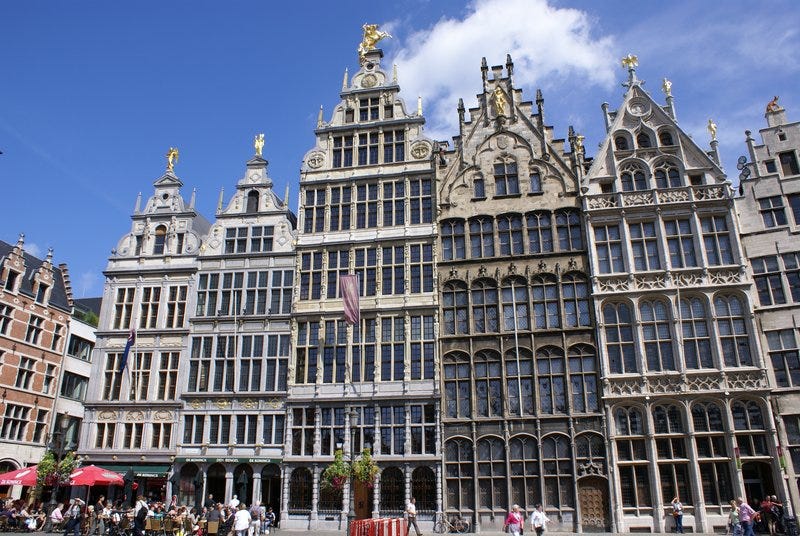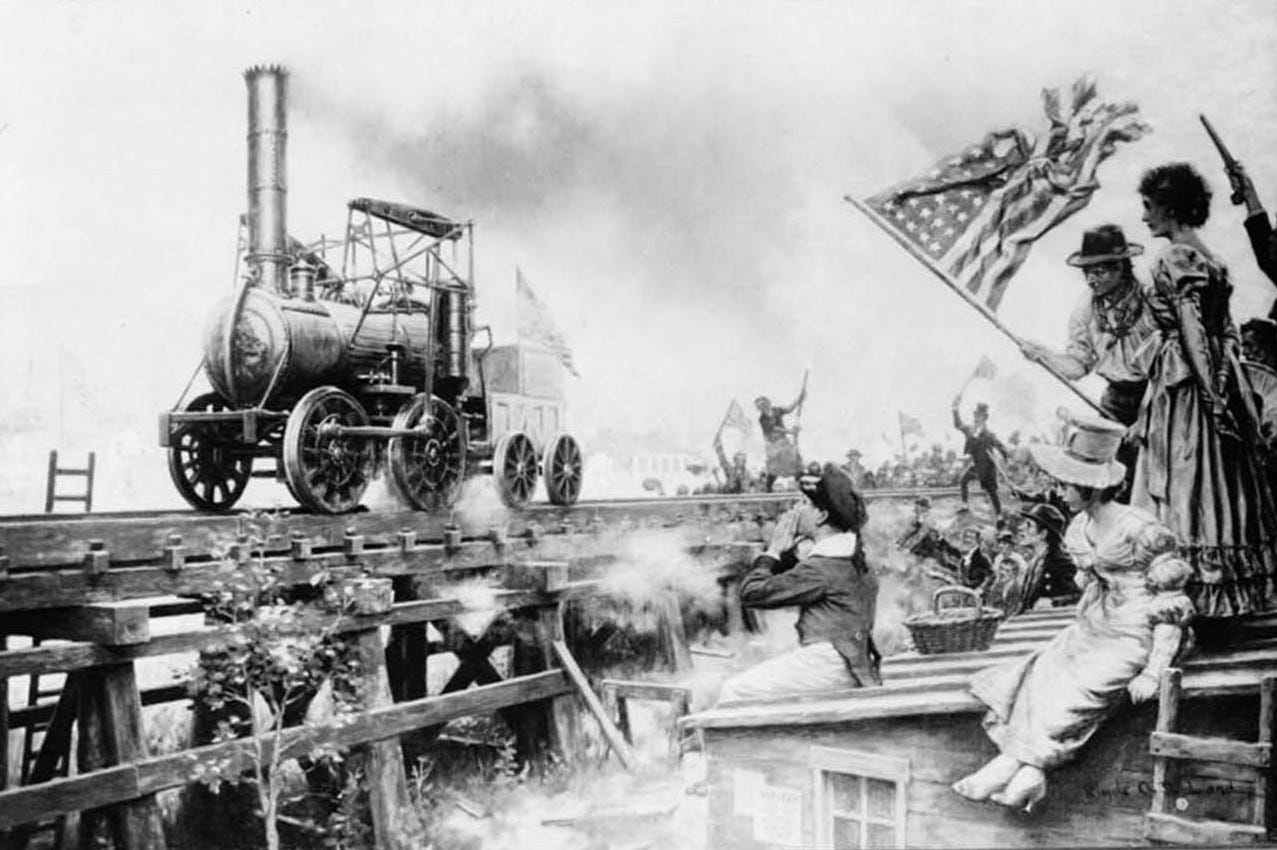The United States is indispensable to global progress
And will likely be so for the foreseeable future.
I believe that the history of progress teaches us five lessons that apply to the United States’ role in the world today:
Material Progress is not inevitable. It is based on unique circumstances that have been very unusual in human history.
Geography, and to a lesser extent politics, are key reasons why so few nations have experienced progress until very recently (i.e. 1990).
In any one time period, there is always one society that is on the leading edge of progress. During that period, that society is “indispensable” to progress.
Progress in any one society can be destroyed by foreign invasion or perhaps other factors.
The dominant power in any one region can play a strong role in promoting progress or destroying it.
At the end of this post, I will explain why I believe that the United States has been indispensable to progress since 1870, but first I want to give evidence that there is always one nation on the leading edge of progress. If for some reason, history had taken a different turn, particularly in warfare, that nation might have been extinguished and progress would have come to a halt.
I believe that human material progress was invented sometime after 1200 CE in the city/states of Northern Italy. For a few centuries, Venice, Florence, Genoa, Milan, and a gaggle of other city/states were the most dynamic economies in the entire world. For the first time in human history, regular everyday persons lived above subsistence levels, which economists estimate is roughly $500/year.
Think about that for a second. For hundreds of thousands of years, everyone, or virtually everyone, had lives that enabled them to barely survive. Then suddenly a little after 1200, one tiny corner of humanity invented progress. I believe they did so by unintentionally inventing four of the Five Keys to Progress. The missing fifth key would not be invented until the UK underwent the Industrial Revolution.
Northern Italy was able to invent progress because it had unique geographical conditions. The region was:
Close to the Middle East, where agriculture was invented, so migrants from that region could bring important agricultural technologies, crops, and domesticated animals
Its Temperate Forest biome, soil, and plains, were conducive to productive plow-based agriculture
Easily accessible to rivers and the Mediterranean sea
On a peninsula with no major military threats
Protected from military invasion from the north by the Alps
Unlike much of Europe, which shared some of the above, Northern Italy also had unique political conditions:
It was part of the Holy Roman Empire (modern-day Germany plus more), an unusually decentralized empire, that simultaneously protected Northern Italians from foreign aggression without repressing them too much.
The rivalry between the Holy Roman Empire and the Pope in Rome enabled the Italian city/states to balance their power off against each other
And most important of all, the region developed a constellation of autonomous cities
Since then societies that experienced progress have hovered on the edge of being wiped out by predatory empires. In Northern Italy’s case, it was the Holy Roman Empire. A few centuries later, the predatory empires of France, Austria, and Spain finally succeeded in conquering Northern Italy. It was the key reason for the end of long-term economic growth in that region.
Fortunately, before progress died in Northern Italy, it had already spread to the city/states of Flanders (modern-day Belgium). The Flemish joined the trend of progress by copying the Northern Italians, improving their innovations, and diversifying them. During the 16th Century, Flanders was on the leading edge of progress, until it was occupied by the Spanish empire.
Later the Dutch Republic copied Flanders in the 16th and 17th Centuries and pushed the process even further. From about 1570 to about 1670, the Dutch Republic was on the leading edge of progress. In fact, by 1670 the Dutch Republic was probably the single richest nation of any pre-industrial society in history. The Dutch leading role in progress ended with the French Invasion of 1672, the dominant military power of the period, and the increasingly predatory nature of the British empire.
Finally, Southeast England copied Dutch progress in the 17th and 18th Century. The British then accelerated human progress with the addition of the fifth Key to Progress: the widespread use of fossil fuels. From about 1670 to 1870, the United Kingdom were “indispensable” to progress.
The British were masters of applying energy derived from coal to new agricultural, transportation, energy, manufacturing, and communication technologies. These technologies radically expanded the overall number and variety of other technologies, skills, and social organizations.
The Industrial Revolution was a truly transformative event in the history of progress. Industrial technologies, skills, and social organizations enable people to overcome many, but not all, of the geographical constraints that previously undermined the possibility of progress. For the first time, people anywhere on the globe had the opportunity to experience progress. They could now escape the trap of geographical constraints.
When contemporary peoples copy the technologies, skills, and social organizations of more successful societies on a grand scale, they can dramatically improve the standard of living and happiness of their people. Japan, South Korea, Singapore, China, and India are just a few of the previously poor nations that recently made a sudden jump to prosperity by copying innovations made in richer nations.
By copying nations who have already achieved the Five Keys to Progress, entire nations can jump from poverty to progress.
Getting back to Northern Italy, Flanders, the Netherlands, and southeast England, these Commercial societies were able to copy the foundations of progress for much the same reasons that Northern Italy was able to invent it in the first place. They each had:
Geographies conducive to progress
Were close enough to each other to enable copying
Were defensible
Competed against each other, so they encouraged innovation.
The US enters the global balance of power
Starting around 1870, the United States began to replace the UK as a society on the leading edge of progress. I am going to write many more posts to go into more detail on each of these, but I think they are fairly obvious to objective observers. For the last 150 years the United States:
Has been on the leading edge of technological innovation, first in manufacturing, but more recently in digital technology. Only the UK and Germany have rivaled the US in this area.
Has had stronger economic growth for a very long period than almost every nation in the world. It was not until after 1990, that East Asian nations surpassed American records in long-term economic growth.
Because of the above, the United States served as an example of a market-based economy in alternative to traditional economies and socialist economies.
Has served as a model and protector of Liberal Democratic governance. In 1870 the United States was almost unique in having a Liberal Democratic government and widespread individual rights, except for racial segregation in the Deep South.
This long-term economic growth enabled the United States to build a powerful military that made nations experiencing progress more powerful militarily than predatory empires. This is in great contrast to the previous 10,000 years of history when predatory agricultural empires dominated.
In the 20th Century the United States was willing to use its military to protect much of the world from predatory empires, including:
Imperial Germany, Austria-Hungary, and Ottoman empires in World War I. The result was the destruction of most European empires on the continent and national independence for over a dozen nations.
Nazi Germany, Fascist Italy, and Imperial Japan in World War II. The result was a re-establishment of Liberal Democratic governments in Western Europe. It also indirectly led to the collapse of the British and French empires and the independence of African and Asian nations.
Soviet Union and Communist China in the Cold War. The collapse of the Soviet Union and the subsequent reorientation of China towards a capitalistic economy has contributed to the greatest economic growth in world history. This would not have been possible without Western victory in the Cold War, and the military and economic power of the United States was indispensable in that victory.
Communist China and Russia moving forward.
After its victories in World War II and the Cold War, the United States did not attempt to establish its own empire as virtually every other victorious power in the past sought. Instead, the United States established a global trade system that encouraged political elites around the world to choose economic development over military conquest. Without this choice, the amazing economic growth since 1990 would not have been possible.
Since 1973 the United States has served as the single largest export market for the rest of the world. Without export markets, those nations would not have been able to establish profitable manufacturing industries that generate revenue for employees, taxes for governments, and opportunities for many smaller local businesses.
Enormous amounts of immigration in the 19th and 20th Centuries from Europe, Latin America, and Asia have likely helped to stabilize those nations by giving an option for frustrated citizens who might otherwise turn to violent revolution.
I am sure that I missed plenty of other reasons why the United States is indispensable to world progress for the foreseeable future. In future posts, I will explain why I do not think that any other nation or groups of nations can take its place on the vanguard of progress.












A happy and prosperous July 4th to all of Michael's US and non-US readers.
One aspect of relative ranking we don't seem to mention or appreciate enough is what the future probably holds. The US is about 5% of the world's population and has about 25% (or more?) of the world's GDP. But if progress proceeds across the globe as this project envisions and hopes, then that relative ranking will change as other groups/ nations also gain increased productivity, prosperity, political freedoms, etc. So we need to keep track that what might look like a relative decline for the US is actually a rise in the rest of the world, as all groups may also increase their absolute measures of wealth, health, longevity, liberty, etc.
"Decline" under those conditions should be explicitly appreciated as an improvement for mankind, not any embarrassment for the US -- which in fact as you state has been a beacon of what is possible, if only more and others would learn from and follow it.
My mention of "liberty" below triggered (retriggered actually) a question that perhaps you have the experience and background to answer somewhat definitively: viz;
It seems there is not yet a clear explanation about the respective sources (or precursors) of liberty vs. prosperity. Did the developing liberty of the early Renaissance as people flooded into towns and away from feudal obligations, formed guilds, etc., lead to their increasing commercial prosperity since they had increasing freedom to engage in business, etc.? Or did the ability to accumulate some levels of wealth (especially post Black Plague?) foster demands for increasing political voice, responsibility, accountability, etc., such that more politically liberal institutions came to the fore?
Or maybe things just developed in parallel and no clear progenitor can be ascertained?
I understand that some of the legal protections and privileges evolved out of the development of Church canon law, coupled with rejuvenating an understanding of prior Roman law. Presumably this also evolved in parallel with the advances obtained by the commercial societies you have discussed.